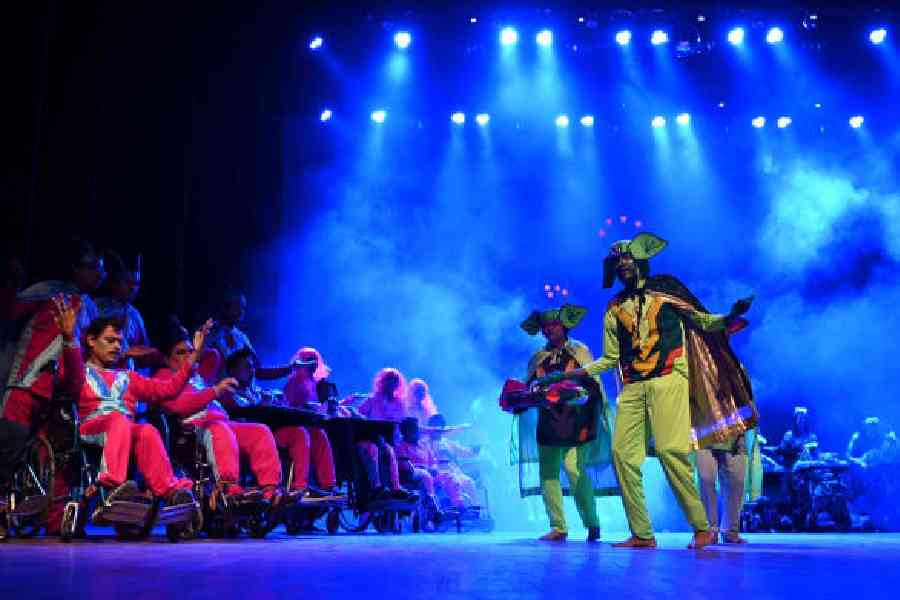An 18-year-old boy cycles to school and then slips onto his wheelchair.
His physical movements and speech are limited to an extent but not his ideas or his use of technology.
Mohammad Aryan, who has cerebral palsy, has typed out a story and used apps to bring his story to life through “voiceovers, animation and visuals”.
The story was adapted into a concert by his institute — the Indian Institute of Cerebral Palsy (IICP) — and staged with 150 children. Ninety of the performers in that show were in wheelchairs.
The story is about the abilities of individuals, something that IICP has been working on since its inception when disability was barely known and little understood.
The institute has journeyed 50 years, from the time it was called spastic society.
They had to explain to government officials that they were not “selling plastics” to now when students use technology to explore their abilities, network or even make friends.
“Technology has enabled our students to have a vast network of friends over social media... and the element of sympathy or awe is not there,” said Swati Chakrabarty, director, information technology, at IICP.
Chakraborty joined in 1989. The institute managed to get two computers to start with.
The institute began as West Bengal Spastics Society in 1974 and was housed in temporary military barracks in the Ballygunge Military camp. It moved to its current address, an accessible building in Taratala, in 1985.
Since 1999, it has been called the Indian Institute of Cerebral Palsy which serves 2,000 beneficiaries every year on average.
“When we began, we were struggling with the next day. But we had hope and conviction that we would do what we set out to do....We had the belief that all children can learn irrespective of their intellectual abilities and they all deserve to have an opportunity, “ said founder and mentor Sudha Kaul.
Kaul, whose son was born with cerebral palsy, had gone to England to get a diagnosis at the Bobath Centre (of cerebral palsy). There she was advised to return to India and do something about cerebral palsy.
She started with two students — her son Arjun and Madhuri Kapur (who is no more) in 1974.
When Arjun, now 55, was wheeled out of the adult daycare centre on Thursday, an employee of IICP said: “He is the reason why we are all here today.”
Miles have been tread but there are miles to go, say those at the institute. “From plastics to spastics to cerebral palsy it has been a positive journey. People know disability, they are aware of it...,” said Reena Sen, vice-chairperson, IICP.
“But miles to go. Even now people in wheelchairs are largely invisible and they have to be so because there are no pavements, gradients of ramps are incorrect, and lifts are tiny where the wheelchair pusher cannot fit in....Schools, colleges, and hospitals do not think through the fact that when we mean accessibility for persons with disability, we mean not just them but anybody who needs a little bit of care. We talk about universal design and that is what we are aiming at,” said Sen.
Discrimination is still rampant, said Nandan Chakraborty. An employee at IICP, he came to the institute when he was six. Now, he is part of the administration. In the office from 9am to 4.30pm, and he goes back home to his wife and two college-going children. “In train, people call me abnormal but I object,” he said.
The institute has an advocacy group — Ankur — and the individuals want greater participation in policies that would improve accessibility. “Unless we have representation in decision making our needs will remain unattended or under-represented,” said Sudipendu Dutta, IT and advocacy trainer, coordinator, Ankur Advocacy Group.
Punam Bind, a member of Ankur, said: “Disability is a challenge which can be overcome by a more inclusive society.”
Sumita Roy, the communications officer, said: “Our focus is to give people with disabilities access to their rights.”
At 50, IICP is trying to create a residential facility. “We plan to provide life-long residential facilities because many parents worry what will happen to their children after them,” said executive director Sonali Nandi.










